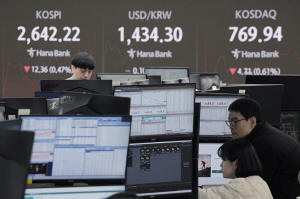World shares are mixed as conservatives win German election
 Send a link to a friend
Send a link to a friend
 [February 24, 2025] By
ELAINE KURTENBACH [February 24, 2025] By
ELAINE KURTENBACH
BANGKOK (AP) — World shares were mixed on Monday after U.S. stocks fell
sharply following reports showing the U.S. economy may be suffering as
consumers and businesses fret over President Donald Trump’s policies.
German shares advanced after conservatives won an election dominated by
concerns about Europe’s largest economy. The DAX jumped 0.7% to
22,439.17 after provisional results confirmed that mainstream
conservatives led by Friedrich Merz won the national election, while a
far-right party surged to become the nation’s second-largest.
In Paris, the CAC 40 shed 0.2% to 8,138.47, while the Britain's FTSE 100
edged 0.1% higher, to 8,669.45.
Markets were closed in Tokyo for a holiday.
In other Asian trading, Hong Kong's Hang Seng index wavered before
closing down 0.6% higher at 23,341.61. The Shanghai Composite index shed
0.2% to 3,373.03.
Australia's S&P/ASX 200 gained 0.1% to 8,308.20. South Korea's Kospi
lost 0.4% to 2,645.27, while the Taiex in Taiwan fell 0.7%. India's
Sensex also declined 0.7%.
On Friday, the S&P 500 sank 1.7% for its worst day in two months,
closing at 6,013.13, after several weaker-than-expected reports on the
U.S. economy. The Dow Jones Industrial Average dropped 748 points, or
1.7%, to 43,428.02, while the Nasdaq composite tumbled 2.2% to
19,524.01.
A report from S&P Global suggested U.S. business activity is close to
stalling, with growth slowing to a 17-month low as activity unexpectedly
shrank for U.S. services businesses. Many in the survey reported
pessimism over the future.

“Companies report widespread concerns about the impact of federal
government policies, ranging from spending cuts to tariffs and
geopolitical developments,” said Chris Williamson, chief business
economist at S&P Global Market Intelligence. “Sales are reportedly being
hit by the uncertainty caused by the changing political landscape, and
prices are rising amid tariff-related price hikes from suppliers.”
"We have factored rising U.S. tariffs and related countermeasures into
our forecasts since December 2024, with trade weakness the primary cause
of the projected slowdown in quarter- over-quarter global real GDP
growth rates this year. Weaker investment is a key downside risk,” Ken
Wattret, a global economist at S&P Global, said in a report.
[to top of second column] |

Currency traders watch monitors near a screen showing the Korea
Composite Stock Price Index (KOSPI), top left, and the foreign
exchange rate between U.S. dollar and South Korean won, top center,
at the foreign exchange dealing room of the KEB Hana Bank
headquarters in Seoul, South Korea, Monday, Feb. 24, 2025. (AP
Photo/Ahn Young-joon)
 A separate report said U.S.
consumers are bracing for higher inflation, in part because of
potential tariffs that could raise prices for all kinds of imports.
They’re broadly expecting prices to be 4.3% higher 12 months from
now, which is a big jump from their forecast of 3.3% inflation last
month, according to a survey by the University of Michigan.
A third report said sales of previously occupied
homes were weaker last month than economists expected. Relatively
high mortgage rates, along with expensive prices for homes, have
been hurting sales.
Stocks of the smallest companies, whose profits can be more closely
tied to the strength of the U.S. economy than big multinational
rivals, fell more than the rest of the market. The Russell 2000
index of small stocks dropped a market-leading
Akamai Technologies had the sharpest drop in the S&P 500, losing
27.1% even though the cybersecurity and cloud computing company
reported stronger profit for the latest quarter than analysts
expected.
Better-than-expected profit reports had been helping to offset
worries about stubbornly high inflation, which could prevent the
Federal Reserve from delivering more relief for the economy and
financial markets through lower interest rates.
The Fed has been holding its main interest rate steady after sharply
cutting it through the end of last year. At their last policy
meeting in January, Fed officials suggested they may stay on hold
for a while given worries about how Trump’s proposed tariffs and
mass deportations of migrants, along with other factors, could push
upward on inflation.
While lower rates can boost the economy, they can also encourage
spending that puts upward pressure on inflation.
In other dealings early Monday, U.S. benchmark crude oil shed 9
cents to $70.31 per barrel in electronic trading on the New York
Mercantile Exchange. Brent crude, the international standard, fell 4
cents to $74.01 per barrel.
The U.S. dollar rose to 149.50 Japanese yen from 149.24 yen. The
euro climbed to $1.0481 from $1.0462.
All contents © copyright 2025 Associated Press. All rights reserved |